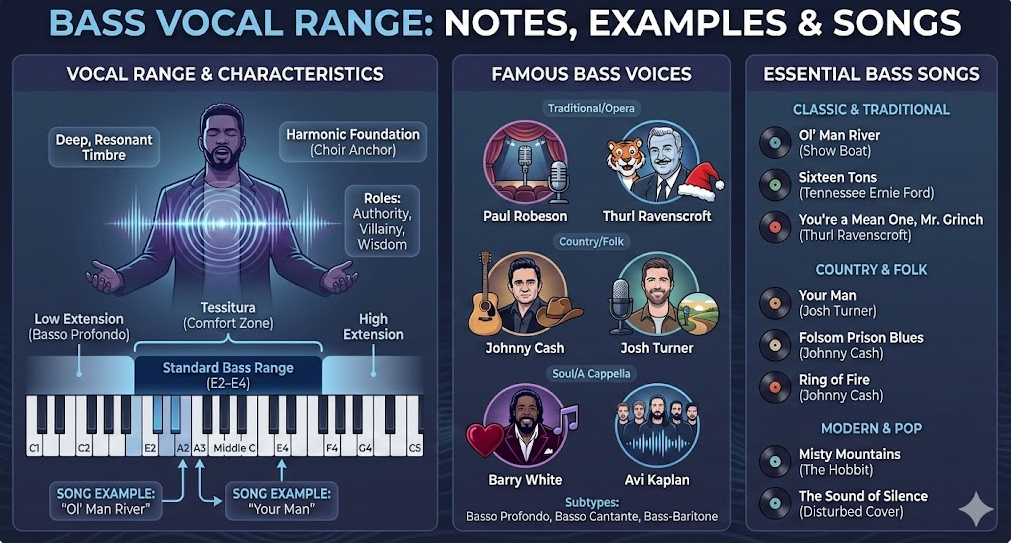The bass vocal range represents the lowest male voice type, known for its deep, resonant, and powerful sound. Sitting below the baritone and tenor voices, the bass range brings a sense of authority and depth to classical music, choral works, opera, and even popular music.
If you’re wondering whether your voice belongs to the bass category, you can easily find your vocal range using our free tool to see where you fit.
What Is the Bass Vocal Range?
The bass range typically spans E2 to E4, making it the lowest male voice type.
| Voice Type | Typical Range (Notes) | Approx. Frequency Range (Hz) |
|---|---|---|
| Bass | E2–E4 | 82–330 Hz |
| Baritone | A2–A4 | 110–440 Hz |
| Tenor | C3–C5 | 130–523 Hz |
Some trained bass singers can go below E2 or slightly above E4, but this is the most common range for bass voices.
If you want to measure your exact range, try the Vocal Range Calculator for accurate results.

Key Characteristics of the Bass Voice
Bass voices carry a sense of power and depth that makes them unique:
- Tone Quality: Dark, rich, and full-bodied with strong resonance
- Musical Roles: Often used for authoritative, villainous, or fatherly roles in opera and theater
- Choral Importance: Provides foundational harmony in choirs
- Versatility: While known for classical music, bass voices appear in pop, jazz, and even rock
Compared to the baritone vocal range (mid-range male voice) and tenor voices (higher male voices), bass singers often bring gravity and richness to ensembles and solo performances.
Types of Bass Voices in Classical Singing
Classical music divides bass voices into several categories:
- Basso Profondo
- Extremely low range with powerful resonance
- Common in Russian choral music and operatic roles requiring dark tones
- Basso Cantante
- Lyric bass voice with smoother quality
- Suitable for operatic roles with melodic lines
- Basso Buffo
- Lighter bass voice often used in comedic opera roles
- Known for agility and expressiveness
- Dramatic Bass
- Strong projection for heroic or villainous characters in opera
Knowing your subtype helps you choose the right training and repertoire.
Famous Bass Singers
Many well-known singers and performers have bass voices, including:
- Boris Christoff – Legendary operatic bass from Bulgaria
- Samuel Ramey – American opera singer known for his powerful bass tone
- Paul Robeson – Actor, singer, and activist with a rich bass voice
- Johnny Cash – Country music icon with baritone-bass qualities
Listening to their recordings helps you appreciate the range, timbre, and style of bass voices.
Songs That Suit Bass Voices
Selecting the right songs for your range ensures vocal comfort and better tone quality.
Beginner-Friendly Songs:
- Ol’ Man River – Show Boat (Paul Robeson)
- Sixteen Tons – Tennessee Ernie Ford
- Ring of Fire – Johnny Cash
Intermediate & Advanced Songs:
- Some Enchanted Evening – South Pacific
- Stars – Les Misérables
- If I Were a Rich Man – Fiddler on the Roof
Before singing, try a daily vocal warm-up routine to prepare your voice safely.
Bass Vocal Exercises & Training Tips
Training your bass voice helps improve depth, resonance, and stamina:
1. Daily Warm-Ups
- Start with gentle humming and sirens in your comfortable low range
- A 5-minute warm-up improves tone and prevents strain
2. Breathing Exercises
- Diaphragmatic breathing builds support for powerful low notes
- Our breathing techniques for singing guide explains step-by-step exercises
3. Resonance Training
- Use “ng” sounds and low hums to enhance chest resonance
4. Range Expansion
- Gradually work on higher notes using safe vocal range expansion methods
5. Vocal Health
- Stay hydrated, avoid strain, and rest your voice when needed
- See our vocal health tips for singers for complete guidance
How to Know If You’re a Bass Singer
You can quickly test your voice using the Vocal Range Calculator:
- If your lowest comfortable note is near E2 or below, you likely have a bass voice
- Compare your results with other ranges like Baritone or Tenor to be sure
Tips for Bass Singers:
- Use Your Chest Voice: Focus on resonance to enrich your tone
- Maintain Good Posture: Proper alignment improves breath control
- Warm Up Consistently: Prevents strain before singing low notes
- Work With a Vocal Coach: Personalized guidance ensures steady progress
- Perform Regularly: Singing in choirs or solo builds confidence and stamina
FAQs About the Bass Vocal Range
Q1: What is the typical bass vocal range?
Most bass singers comfortably sing between E2 and E4, with some extending below or above.
Q2: Can bass singers hit high notes?
Yes, using safe range expansion techniques, many bass singers develop flexibility in their upper range.
Q3: What songs work best for bass singers?
Songs by Paul Robeson, Johnny Cash, and musical theater classics suit bass voices well.
Q4: Are there different types of bass voices?
Yes, classical music recognizes basso profondo, basso cantante, dramatic bass, and others.
Q5: How do I know if I have a bass voice?
Testing your range with the Vocal Range Calculator is the easiest way to find out.
Main Interactive Tools:
- Vocal Range Test – find your exact highest and lowest notes online in seconds.
- Vocal Range Calculator – measure and record your range accurately using your microphone.
- Singer Comparison Tool – compare your vocal range with famous singers and see where you align.
- AI Voice Analysis – get instant feedback on your tone, pitch stability, and clarity through advanced AI.
- Song Key Finder – discover songs that naturally fit your vocal range and tessitura.
- Ear Training Game – improve pitch accuracy and interval recognition through fun listening challenges.
- Microphone Tester – check your mic setup before testing your range or recording vocals.
